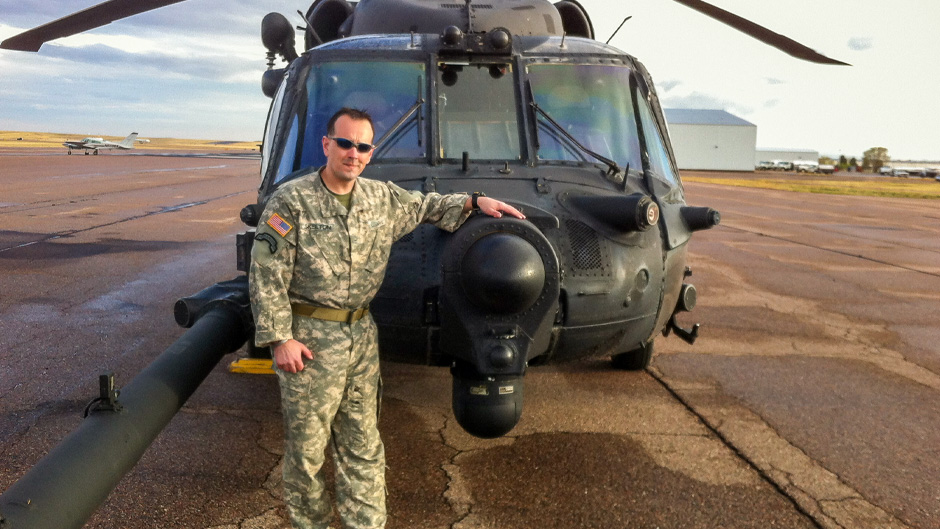As he prepared to graduate from high school in the late 1990s, Arizona teen Taylor Skelton knew he wanted adventure—though exactly what kind, he wasn’t sure. Then he saw the frenetic action movie “Con Air”, and his future locked into focus: He wanted to be an Army Ranger.
After several years in the Army, Skelton decided to apply to the U.S. Army Aviation School. “It was terrifying,” he admitted. “I had never flown anything but a kite before.” But he went on to complete officer training and flight school with flying colors.
Now a graduate of the Accelerated B.S.N. program at the University of Miami School of Nursing and Health Studies, Skelton is the veteran of a distinguished military career spanning two decades and countless challenges. As a Blackhawk helicopter pilot deployed to multiple special ops missions in combat environments such as Iraq and Afghanistan, he flew hundreds of hours without incident. He has led surveillance missions, helped capture insurgents, trained military parachuting, and served as a medical evacuation pilot, a special operations pilot, and an instructor pilot.
Skelton is also a husband and father of two. His wife, Melanie, an internal medicine physician when they met, has since moved into palliative medicine. Inspired by both her technical skills and caring spirit, Skelton considered going to medical school when he retired from the military. Then his wife arranged for him to shadow some nurses and he gravitated toward a new goal: becoming a certified registered nurse anesthetist.
With family in Florida, Skelton applied to several nursing schools in the state. “UM was a long shot,” he said, “but it was my first choice. I knew I wanted a very strong, innovative program, and I was impressed by the absolute professionalism of the faculty and administration.”
Not that Skelton’s military background bred an automatic acceptance of received wisdom.
“Helicopter pilots are, as the phrase goes, brooding, introspective anticipators of trouble,” he said. “We are always asking ourselves, ‘What did I miss?’ ‘What do we need to ensure success?’ ’’ he added.
“The level of detail in our planning was extreme. We would plan for days for a mission that would only last an hour. Our backup plans had backup plans,’’ he pointed out. “So, I don’t take things at face value. If you tell me something is so, I want to know why. I enjoy that our professors are not afraid to be challenged—they’re willing to engage.”
Skelton has found simulation-based education especially powerful. “As you confront these scenarios designed by expert faculty based on their own experiences, you may think you know what is happening,” he said, “but then things flip 180 degrees. I call it teaching by humility. It’s a big slice of humble pie, but you are better for it.”
Earning a Bachelor of Science in criminal justice and homeland security in 2016, Skelton continued his impressive record of achievement at the School of Nursing and Health Studies. He made the Dean’s List, received a Florence Bayuk Nursing Educational Trust Fund Scholarship, and he was involved in several nursing and student organizations.
He now plans to gather a few years of professional experience, preferably in the intensive care setting, before applying to graduate school. Meanwhile, he’s soaking up the adventure of his nursing education. “As soon as I set foot on campus,” Skelton said, “I knew this was where I wanted to be.”

